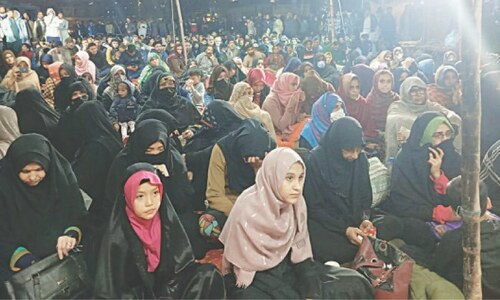KARACHI, Nov 29: The health department of Karachi City Government has formed five vigilance committees to supervise and evaluate the functioning of all health facilities in various towns of Karachi.
These teams will be responsible for proper functioning of all medical units in their respective towns. Each team will comprise three doctors from the health department of the city government and will look after three or four towns.
The following teams have been constituted:
Team No 1: Dr Abdul Qadir Shaikh, district officer (administration and accounts); Dr Ashfaq Hussain, deputy district officer, M&E, and Dr Sahib Jan Badar, town health officer, Jamshed town. The team will look after Gadap, Gulshan, Jamshed and Shah Faisal towns.
Team No 2: Dr Kunwar Qureshi, district officer, preventive; Dr Abdul Salam, deputy district officer, public health; Dr Syed Waqar Ali, town health officer, Shah Faisal town. The team will look after Landhi, Malir, Korangi and Bin Qasim towns.
Team No 3: Dr Laiq Ahmed, district officer, quality control; Dr Fasih Rehman, town health officer, Liaquatabad; Dr Hasan Javed, town health officer, Baldia. They will look after Liaquatabad, Gulberg and North Nazimabad towns.
Team No 4: Dr Nazir Ahmed Kolachi, district officer, curative; Dr Asghar Abbas, deputy district officer hospitals; Dr Shakeel Malik, town health officer, Orangi. The team will look after Saddar, Keamari and Lyari towns.
Team No 5: Dr Pervaiz Sarwar, district officer, procurement; Dr Waqar Ahmed, town health officer, North Nazimabad; Dr Suleman Otho, deputy district officer, planning and development. The team will look after Orangi, SITE, New Karachi and Baldia towns.
With the inclusion of 91 medical units of the Sindh government, having an annual budget of about Rs 900 million, the health department of the city government has become its largest department. However, it is yet to seek public confidence by delivering the required medical facilities to the residents of Karachi.
The health department has a total of 259 medical units, including 14 major hospitals, some teaching hospitals, 144 dispensaries, 31 basic health units and 40 mother and child health centres, apart from Unani and homoeopathic hospitals, emergency centres and other units.
The Karachi City Government is the only local body in Pakistan which is running a medical and dental collage also.
The health department has seven district officers of grade 19, including one each for curative side, preventive side and one vector control and fumigation for the city, whereas one deputy district officer is an epidemiologist to check the possibility of the spread of any endemic disease.
Presently, the department will be running eight preventive programmes for the general public, which are mainly funded by international donor agencies, which include malaria control program, T.B. programme, AIDS programme, expanded programme of immunization, health education programme, national programme for PHC & FP and the women’s health project.
The expanded programme of immunization is for reducing the incidence of diphtheria, tuberculosis, neo-natal tetanus, poliomyelitis and measles in pregnant women.
Apart from this, preventive vaccines of Hepatitis-B are also being given to new-borns in Saddar town. The scheme is expected to be started in other towns in a couple of months.
A decision about the formation of the committees was taken following a visit by the Sindh governor to the Sindh government hospital, Korangi where he noticed that a majority of the doctors and paramedics were absent from duty. Nazim Naimatullah Khan and Naib Nazim Tariq Hasan were also present during the visit of the governor.—PPI














































Dear visitor, the comments section is undergoing an overhaul and will return soon.